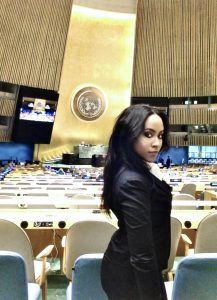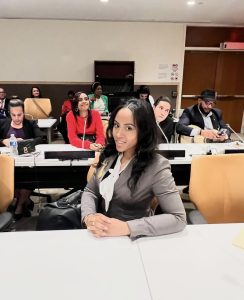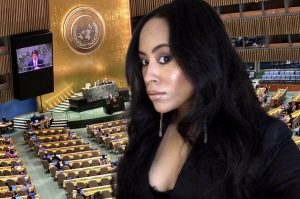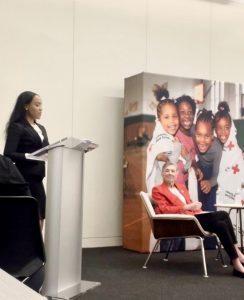Valerie Reynoso is a versatile professional whose career spans diplomacy, law, and the arts. Starting with a passion for visual arts, she later developed a deep interest in politics during high school. Reynoso pursued a degree in Politics and Human Rights at Marymount Manhattan College, which led her to a pivotal internship at the Dominican Republic’s UN Mission.
Furthering her diplomatic journey, she earned a Master’s in International Affairs from Columbia University, advising at the UN Missions of El Salvador and Panama. Now a Juris Doctor candidate, she also serves as Vice President and UN Legal Envoy at the Global Organization for Sustainable Development Goals, Inc., advocating for a more inclusive global landscape.

1. Your journey has taken you from being a political analyst to a Juris Doctor student, with experience as a UN Advisor, academic, and artist. Could you share what inspired this diverse career path and how each facet has contributed to your mission?
Visual arts and academia were my first indispensable passions ever since I was a child. Throughout my childhood, I participated in several art programs (i.e., the Learning Through Art program of the Guggenheim Museum) and I attended the Harlem School of Arts and The Art Students League, in New York City. My passion for politics was first ignited when I was in high school. This is when I realized that this is a part of my life purpose. I went to Fiorello H. LaGuardia High School, where I majored in visual arts and was a part of a club of politically conscious students. Shortly after, I began engaging in political writing for several news media and organizations, which I continue to do to this day.
As I pursued my Bachelor of Arts degree at Marymount Manhattan College, I majored in Politics and Human Rights. There was a United Nations Program for students when I was there, where only a limited amount of applicants were admitted to intern for NGOs affiliated with the United Nations Secretariat. I had applied for this program and, initially, I did not get in. I applied for several internships at the United Nations Permanent Missions and got accepted into an internship at the Permanent Mission of the Dominican Republic to the United Nations. I had defied the odds and achieved my goal of becoming a part of the program and of starting my career at the United Nations. Given this, Marymount allowed me to form part of its United Nations program. During my time at the Mission, I realized that I wanted to continue working in diplomacy and that international affairs is a specific component of politics that I am most intrigued by. I also realized that I would also need to get a Master’s degree to satisfy the technical requirements of becoming a diplomat.
After my time at the Dominican Republic Mission, I became a government-appointed Adviser at the Permanent Mission of El Salvador to the United Nations. After that, I began a Master of International Affairs program at the Columbia University School of International and Public Affairs in January 2021. During my time at Columbia, I became a government-appointed Adviser at the Permanent Mission of Panama to the United Nations for a few months. Also, for my Capstone Project for my Master’s program there, I became a graduate consultant and project manager for the United Nations Department of Economic and Social Affairs, with a cohort consisting of a few other students from my program. I also became an Instructor at Columbia University’s School of Professional Studies, during the latter half of my program. I co-taught undergraduate courses on international relations, foreign policy, international security, political theory and history.
My time at Columbia University also inspired me to pursue law school after graduation. I harmonized my goals and determined that becoming a lawyer specializing in international law aligns with my interests and career goals because I aspire to work at a law firm affiliated with international organizations and engage in diplomacy that way.
After I graduated from Columbia, I began my Juris Doctor program, with an area of study
in Government and Public Interest Law, at a law school in New York. In addition to being a
second-year law student, I am also currently the Vice President and UN Legal Envoy of the Global Organization for Sustainable Development Goals, Inc., an NGO in consultative status with the United Nations Economic and Social Council. Here, I lead its legal analyses, proposals and diplomatic correspondence at the commissions and the General Assembly of the United Nations. Each of these aforementioned facets have made me into who I am today and are a part of my journey in my career and in my personal growth.
2. As someone deeply involved in diplomacy and international affairs, how do you see the role of women evolving in these fields, and what steps can be taken to further empower women in global politics?
As someone deeply involved in diplomacy and international affairs, I see the role of
women already evolving in these fields, such that there are more women taking on positions of power in fields and occupations where our voices are typically, virtually invisible. This also relates to the increase in women pursuing higher education, establishing businesses and achieving more elevated socioeconomic statuses. The steps that can be taken to further empower women in global politics is to not limit our scope of gender equity to politics of representation or identity reductionism. This means that we must ensure that women that rise as global leaders also have effective policies that positively affect women and other groups of people. Education is one of the key equalizers of society, so we must also encourage and socioeconomically support women to pursue higher education. We should also continue to support and expand the current initiatives of international organizations, NGOs, and grassroots organizations aimed at achieving gender equity, women’s rights, anti-war advocacy and foreign policy that adheres to international law and that preserves the self-determination of countries subject to war or conflicts, and the dignity of its subsequent marginalized populations.
3. Your heritage plays a significant role in your life and work. How has your dual
citizenship and Dominican roots influenced your perspective on inclusion and
representation in the legal and diplomatic arenas?
My dual citizenship and my Dominican roots influence my perspective on inclusion and representation in the legal and diplomatic arenas because they are some of my driving sources of inspiration and obligation. I have written extensively and authored numerous publications on Dominican history, politics and international affairs. I carry the homeland of my family and ancestors in my heart wherever I go. My family brought me up immersed in the culture of my ancestors. This influences my perspective on inclusion and representation because I know that others around the world also hold their cultures and backgrounds close to them. This makes me conscious of the fact that others around the globe are just as worried about the impact of politics and foreign policy on their backgrounds as I am about their impact on mine. This is why I believe that it is essential for people of diverse origins and philosophies to be included in legal and diplomatic arenas. Effective foreign policy and international cooperation necessitate this.

4. In your extensive work at the UN Permanent Missions, you’ve been an advocate for underrepresented groups. Could you tell us about a specific project or initiative you’ve been involved in that has made a meaningful impact on these groups?
A specific initiative that I have been involved in that has made a meaningful impact on underrepresented groups was when I was working in the Second Committee of the United Nations General Assembly, which covers the topics of global finance and economic matters. Some of the work that I did there was that I was sent to several meetings co-hosted by many high-level figures and entities, including the Organization of American States, H.E., Princess Haifa al-Mogrin of Saudi Arabia, and H.E., the Vice-Secretary General of the United Nations, Amina Mohammed. In these conferences and group meetings, I engaged with these figures, other diplomats and El Salvador’s government to negotiate official United Nations resolutions and to come up with international strategies that, upon implementation, will serve the purpose of closing the gender wage gap, to economically empower marginalized communities of the Global South, and to promote the harmonization of foreign policies on a global scale.
5. Your dedication to advocating for the wellbeing of women and Latino descendants is inspiring. Can you share some key strategies you believe can create a more inclusive and diverse legal and security landscape?
Some key strategies that I believe that can create a more inclusive and diverse legal and security landscape are the continuation of the promotion and creation of diversity fellowships and job opportunities, widened recruitment efforts in law firms and throughout international and governmental entities, the strengthening of anti-discrimination laws and regulations, the enhancement of professional mentoring opportunities for young women and those of other backgrounds, the expansion of diversity and inclusion policies and cultural competence training in said fields, and the enhancement of collaborations and partnerships with leaders and professionals from diverse backgrounds and communities. The achievement of a more inclusive
and diverse legal and security landscape necessitates the assimilation of measures, such as those indicated above, to maximize socioeconomic, ethnic and gender equity and equal opportunity throughout the international and governmental arenas.

6. Being both an artist and an academic, how do you find ways to blend your creative side with your academic pursuits and career in diplomacy and law?
Being both an artist and an academic, I find ways to blend my creative side with my
academic pursuits and career in diplomacy and law. Politics and diplomacy are forms of art through which we collectively build our realities in the world that we inhabit and the state apparatuses in place that inform that order. Art is not limited to visual arts because it is a continuous expression of the human psyche and ability. Its permeative nature engulfs our worldview and the lens through which we collectively view the world. Art refines the order and justice instilled through law and the eloquence and performance skill that serve as vital cogs of diplomacy and academia. For these reasons, first and foremost, I am an artist in all ways and I apply this philosophy throughout my trajectory of life.
7. As a woman in traditionally male-dominated fields, what advice do you have for young women aspiring to make their mark in diplomacy, politics, and law?
As a woman in traditionally male-dominated fields, the advice that I have for young
women aspiring to make their mark in diplomacy, politics, law, etc., is, firstly, to never allow anyone to make them feel that they cannot achieve what they have set out for themselves and to never stop fighting for the aspirations that matter to them. They should not allow the discouragement or negative criticisms of others prevent them from reaching their full potential. Oftentimes, those who try to discourage us from realizing our dreams do so because they have already given up on their own dreams. Also, young women should aspire towards obtaining higher education, relevant experience and to make a regular habit of reading literature and the news, writing and analyzing—all of which I do every day. It’s crucial to maintain an insatiable appetite for knowledge and for finding answers to questions that most intrigue us. It’s also key to find your voice and human capital as a person and to implement this into all that you do, particularly in the aforementioned fields, where those characteristics typically make people stand out.
8. Can you share a personal or professional achievement that you are particularly proud of, and what lessons did you learn from that experience?
A personal achievement that I am particularly proud of is my family. None of my career or academic-related achievements would hold as much weight as they do without my family, which is the main reason why I work and study in the first place, on a personal level. The lesson that I learned from this experience is that familial cohesion is one of the key tenets of my life and I believe that it should also be for others because at the end of the day, we go home to our families and share our successes and overall lives with them.
A professional achievement that I am particularly proud of is when I formed part of the El Salvador delegation for the High-Level Week of the 74th session of the United Nations General Assembly, when I was an Adviser at the Permanent Mission of El Salvador to the United Nations. I took charge of the seat of the El Salvador delegation on some days at the United Nations General Assembly Hall and I was notably one of the few women to do that for a respective delegation that year. I provided strategic support, prepared government documents and collaborated with a team of some of Mission’s other diplomats and executive figures of El Salvador’s government. The lessons that I learned from this experience is that teamwork will always be a part of any successful effort or act towards achieving a goal that ultimately has a positive impact on the world. Additionally, when I was an Instructor at Columbia University, I shared my experiences at the United Nations Permanent Missions and in politics with my students, which also influenced them in defining their own career paths and aspirations. We all deliver our drop of water into the collective river.

9. The intersection of gender and diversity is a critical topic today. How do you see the conversation evolving, and what role do you hope to play in shaping this discourse?
Women are defying antiquated norms that state that we can only be limited to a life of domestic or second-class citizen servitude and to subscribe to someone else’s tenets instead of having our own philosophies. We are gradually gearing towards a society where it is increasingly becoming more commonplace for women to step into their power, find their voice and life purpose and to actively pursue their fulfillment. The role that I hope to play in shaping this discourse is to be able to continue advocating for, and informing others on, the presence and rise of women in careers and spaces where we are historically not as visible or heard. I want to establish myself as a lawyer-diplomat so that I can continue engaging these questions with governments and in the international arena. I also want to continue mentoring other women to assist them in achieving their career and educational goals, and to ensure that they know to never give up on what is important to them. I hope that my achievements and vision continue to inspire
other women to also bring their own aspirations to fruition in their own lives.
10. Looking ahead, what are your aspirations and goals for your career, both as a Juris Doctor student and as an advocate for underrepresented groups, in the coming years?
My aspirations and goals for my career, as a Juris Doctor student, and as an advocate for underrepresented groups, in the coming years, are to graduate from law school and pass the Bar exam, along with all of the other related legal exams required to practice law in the U.S., to get a job at a law firm affiliated with international organizations, governmental entities, and international law courts in Europe, to continue working with the United Nations and provide legal support to its organs and purposes and to NGOs in consultative status with the United Nations. I would also like to expand my personal efforts in socioeconomically supportingunderrepresented groups and women in obtaining their basic necessities and securing their educational and socioeconomic stability. Every step towards fulfilling my future aspirations is directly driven by all that I have already constructed.
